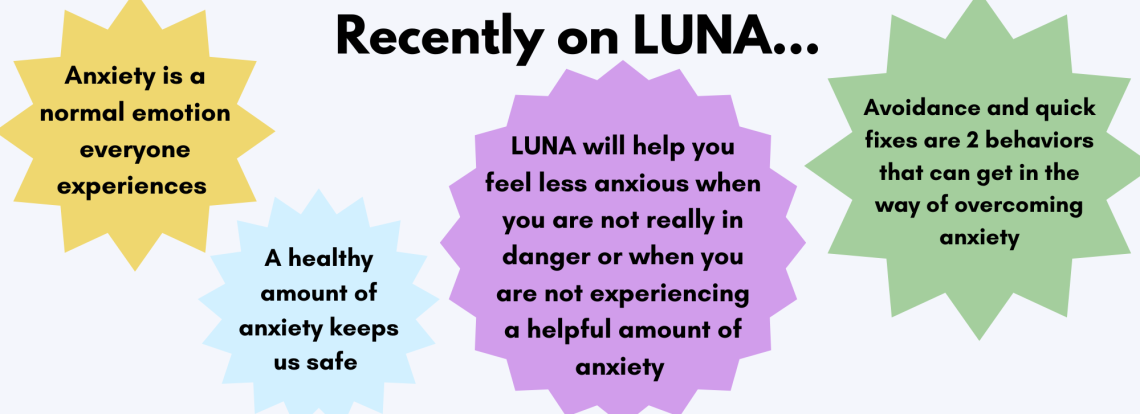When faced with anxiety, fear, or worry, we might think that avoidance will help us become less anxious. Avoidance can take on many different forms, such as:
- "Escaping” from a situation that makes you anxious (like leaving a birthday party early because you are afraid that others are judging you),
- Refusing to put yourself in a situation that makes you anxious (like not going to the beach with your friends because you are afraid of the water),
- Distracting yourself from your anxieties (like watching anime on your phone when you are in a stressful situation so you don’t have to think about it)
- Or procrastinating on tasks that make you anxious (like not studying for a big test you are worried about).
You may also think that “quick fixes” will help you become less anxious. For instance, you may repeat certain actions because they make you feel less anxiety about something, like checking to make sure your front door is locked over and over again, or asking a parent over and over if everything is ok.
While avoidance and quick fixes might make us feel better in the moment, they can hurt us in the long run. The more you avoid your anxieties, the stronger they get.
Remember the avoidance cycle? Let's look at this cycle to see what happens when George does not confront his fear of germs. The cycle begins when George encounters a trigger, which is the germs he believes are around him. George cannot stop worrying about germs and about getting sick. These thoughts cause George to feel afraid and anxious. Instead of facing his fear of germs, George avoids touching anything that could be dirty. This makes George feel less afraid at first. But George is still just as scared of germs as before. In fact, as George continues to avoid touching different objects, he becomes MORE afraid of germs over time.
Instead of avoiding our anxieties, we need to face our fears to overcome them. Psychologists have a word for this strategy: Exposure. So far in LUNA, you’ve learned a lot about anxiety, but it is not enough to just think or talk about your anxieties. At some point, you need to face what is making you afraid, and that is where exposure comes in. Exposure works because it helps you:
- get used to your fears over time
- learn that what you are afraid of probably won’t happen, and if it does happen, that you can handle it
- believe in yourself, and learn how to handle stress
- and live your life the way you want!
Don’t worry, in LUNA we will not ask you to face your biggest anxiety right away if you don’t feel ready to do that. Instead, you will be developing a plan of action that helps you slowly and gradually face things that make you anxious. Your plan will have many steps or activities for you to complete. You will start with a task that you feel ready to do, which might be something that does not make you feel too anxious, and work your way up to a task that shows you have really conquered this fear or anxiety. The last activity in your plan of action will be the goal that you are working to accomplish!
Sophia’s plan of action will help her face her fear of others judging her. Ultimately, she wants to be able to give a presentation in front of her class at school. Sophia has filled her plan with activities that will help her work her way up to this goal. Here are some of the exposure activities in Sophia’s plan:
- Have a conversation with a friend at school
- Talk to the waiter and order on her own at a restaurant
- Eat lunch with a group of people at school instead of on her own
- Raise her hand and answer a question in front of the whole class
- Go to a classmate’s birthday party and join in on a group conversation at the party
- Give a presentation in front of her class!
Sophia created this plan of action with her mom's help. She is going to practice at least one of these activities every day. All these activities will help her reach her goal because they all challenge her fear that others will judge her. Sometimes she will try the same activity over again, and sometimes she will mix it up, trying different exposure activities until she feels ready for the last, most challenging one. Every time she completes an activity, Sophia gives herself a motivation booster. A motivation booster is a reward Sophia uses to keep her feeling supported and enthusiastic as she reaches her goal. Sometimes, Sophia gives herself points for completing an activity instead. She can then exchange these points for a motivation booster so that she receives her reward indirectly instead of right away. Identifying when you are anxious and keeping yourself motivated are going to help you in this journey. In the next section, you will learn how to put together your own plan of action and give it a try yourself. You can do this!









